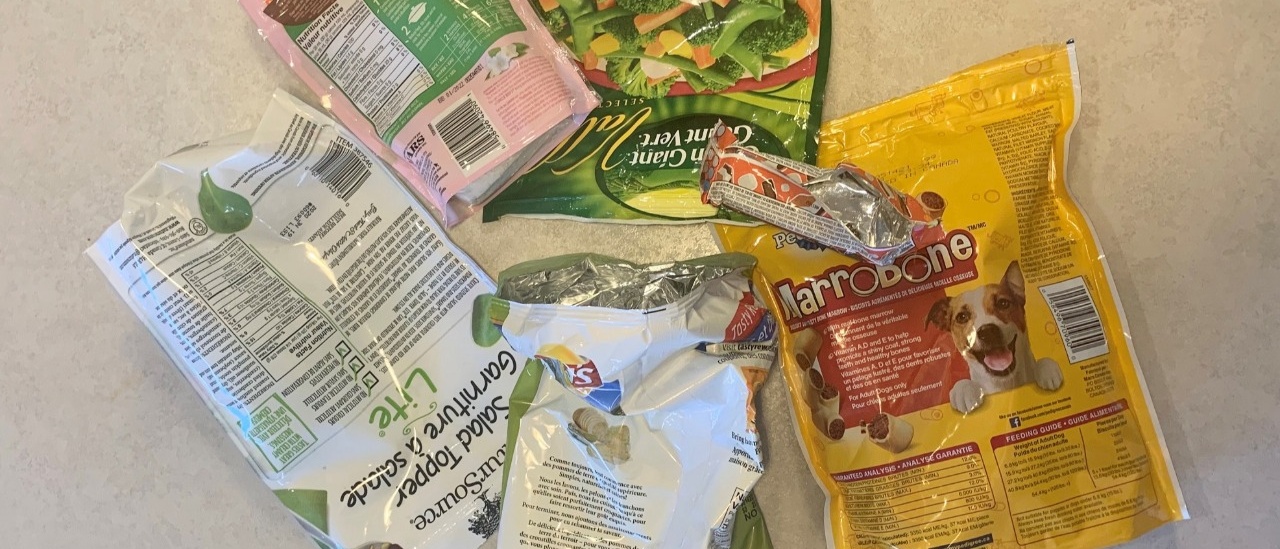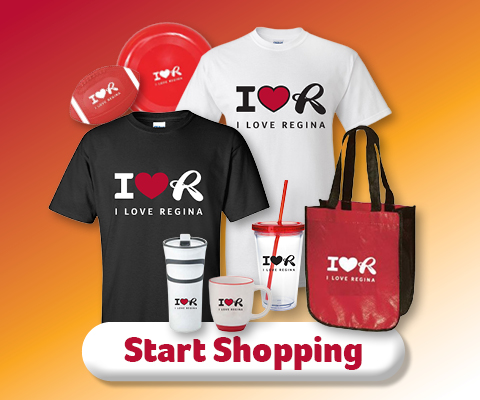Keep Crinkly & Stretchy Plastic Out of Recycling
Please refrain from placing plastic bags, including items like plastic wrap, Ziploc bags, chip bags, and similar items, in recycling bins. Plastic bags can cause complications at recycling facilities. Their stretchy nature often leads to entanglement in sorting equipment, disrupting the sorting process and potentially causing recyclable materials to be misallocated. Consequently, the sorting line may need to be shut down more frequently for equipment maintenance. This not only compromises the quality of recyclables but also increases the cost and inefficiency of the sorting process. By disposing of plastic bags properly, we can contribute to keeping recycling program costs low and ensuring the effectiveness of recycling efforts. Thank you for your cooperation in recycling right.
Video Transcript
|
Audio |
Visual |
|
“Have you ever wondered what types of plastics are recyclable?” |
A sign for Emterra Environmental Single Stream Recyclable Materials Recovery Facility is shown. A timelapse of a front loader moving recyclable materials around the facility follows. |
|
“We’re here at the recycling facility to show you a few tips to help make sure your recycling efforts count!” |
A woman wearing personal protection equipment (PPE) walks toward the camera while inside the Emterra recycling facility. |
|
“Be sure to only put plastic packaging labelled #1-7 in your blue recycling cart.” |
Close ups of a variety of plastic containers and their recycling numbers are shown. |
|
“Some examples include: a plastic yogurt container, a mouthwash bottle, and a plastic clamshell container.” |
A woman wearing PPE displays a yogurt container, mouthwash container, and clamshell container while standing inside the Emterra recycling facility. |
|
“Please don’t put plastic bags or wrap in the recycling.” |
Slow motion footage of a recycling truck dumping materials followed by a shot of plastic bags caught in the spinning machinery. |
|
“If the plastic stretches, or you can poke your thumb through it, then it’s not recyclable.” |
Footage of hands stretching plastic wrap followed by a shot of a thumb pushing through a plastic bag. |
|
“Stretchy plastics get caught around the spinning machinery that sorts the recyclables. When this happens, it can sort the material into the wrong category and this can lower the quality of the good recyclables. ” |
Slow motion footage of materials traveling on a conveyor belt and plastic bags being cut from the spinning machinery. |
|
“Here’s a quick recycling tip: if the plastic bag or wrap makes a crinkly sound, or you can tear it, it should be placed in the garbage.” |
Footage of a man sorting materials on a conveyor belt. A close up shot of a woman crinkling plastic next to her ear. A shot of a woman tearing a plastic chip bag and placing it in a garbage bin. |
|
“We want you to be proud of the difference you’re making with your commitment to recycling. Let’s recycle the right stuff! Place your plastic bags or wrap in your brown garbage cart. |
Footage of recyclable materials traveling along a conveyor belt is shown. A woman talks to the camera. |
|
Visit Regina.ca/plastic for more details and tips on recycling plastics.” |
Text appears across the screen including a link to Regina.ca/plastic. The City of Regina logo also appears in the bottom right hand corner. |
Try the Stretch Test!
Does the plastic stretch when you pull it? Can you can poke your thumb through it? If you answered yes to any of these questions, then it’s not recyclable in the blue cart. Common examples:
- Grocery bag
- Bread bag
- Produce bag
- Saran wrap
- Bubble wrap
- Overwrap on a pop case
Do the Crinkle Test!
Does the plastic bag or wrap make a crinkly sound or tear easily? If yes, these plastics are also not recyclable in your blue cart. Common examples:
- Chip bag
- Frozen vegetable bag
- Pasta noodle bag
- Pet food bag
Plastic Checkout Bag Ban
Learn more about the Bag Ban Bylaw below
The Plastic Checkout Bag Ban Bylaw prohibits a retail or food service business from:
- providing, distributing or selling plastic check out bags (including biodegradable plastic)
- restricting or denying the use of any reusable container or reusable bag by a person
The Plastic Checkout Bag Ban BylawOpens in new window is intended to minimize plastic waste entering the landfill, prevent plastic litter and to extend the life of the landfill.
The average Canadian uses 200-300 plastic checkout bags a year which means that Regina residents produce millions of single use plastic bags annually. Even if you reuse some of your bags, many are ending up in our landfill or littered throughout our community. This ban will eliminate the excess from our community.
Exceptions
The ban only applies to bags provided to customers at checkout. Businesses may only provide plastic bags for the following purposes:
- carrying fruits or vegetables
- carrying freshly prepared bakery items or other food items that are not pre-packaged
- transporting wrapped flowers or potted plants
- containing bulk food items or bulk hardware items
- transporting live fish
- covering clothes immediately following professional laundering or dry cleaning
- covering newspapers or other printed materials intended to be left at the customer’s residence or place of business
- carrying prescription drugs received from a pharmacy
- carrying fresh or frozen meat, poultry, fish or frozen foods whether pre-packaged or not
- protecting linens, bedding or other similar large items that cannot easily fit in a reusable container
- protecting tires that cannot easily fit in a reusable bag
- using at the customer’s residence or place of business, provided such plastic bags are pre-packaged and sold in packages of multiple bags
To help inform your customers about the change, you can find a variety of promotional materials to use in our Plastic Checkout Bag Ban Business Toolkit.
| Business Toolkit | |
| Business Toolkit Info Package | |
| Facebook Posts | |
| Facebook Post 1 | Facebook Post 2 |
| Facebook Post 3 | Facebook Post 4 |
| Facebook Post 5 | |
| Website Banner | |
| Web Banner Image | |
Businesses can sign up to receive email notifications about the Plastic Checkout Bag Ban Bylaw.
We’ll send updates on:
- Updates on the Bylaw
- Regulatory advisories and announcements
- Communication material to help inform customers and employees
Learn more about the plastic checkout bag ban.
Who does this Bylaw apply to?
All food service, retail and service businesses in Regina are required to comply with the Bylaw.
This includes, but is not limited to:
- Food vendors
- Retailers
- Second-hand stores
- Street vendors
- Vendors at festivals, special events, and markets
How is this Bylaw enforced?
A designated officer will follow-up and investigate any complaints.
What is considered a plastic checkout bag?
The Bylaw defines a plastic checkout bag as any plastic bag that is intended to be used by a customer for the purpose of transporting items purchased or received by the customer from a retail business, food service business or service business but does not include a reusable container.
What is a reusable container?
The Bylaw defines a reusable container as any receptacle or enclosure for holding a product for the purpose of transporting items purchased or received by the customer from a retail business, food service business or service business and includes, but is not limited to, a bag that is designed and manufactured for multiple uses and is primarily made of cloth or other washable fabric.
Is this change expensive for residents?
Customers may bring their own reusable bags to package groceries or other purchases for free. Many retail businesses and food service businesses are also offering and charging a fee for paper checkout bags, so a small investment in reusable bags will pay for itself over time.
Why does the bylaw only include plastic checkout bags? What about other single-use plastic items?
Since most people make in-store and grocery purchases, and reusable bags are easy to bring from home, this is a simple way to address one type of plastic consumption.
Residents are still encouraged to reduce plastic in other areas of their everyday life such as switching to reusable water bottles, coffee and beverage cups, skip the straw, etc.
What about the Federal Ban on Single-Use Plastics?
The federal government has said single-use plastic items like plastic checkout bags, straws and cutlery will be covered by a national ban coming. The regulations to introduce the ban will be finalized by the end of 2022.
Not Sure Where to Put an Item?
Check out the Waste Wizard tool to find out how to properly dispose or donate common waste items.
Regina residents are making a big difference when it comes to recycling. Together, we’ve redirected more than 85,000 tonnes of recyclable material from going to the landfill since 2013.









